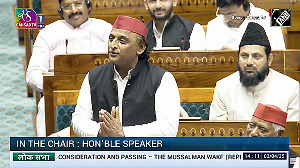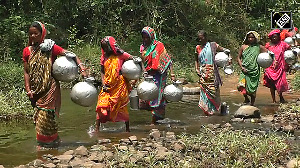With several state governments formally declaring parts of the country as drought-hit, auto manufacturers fear they will see a negative impact on sales. The main reason is that they have a decent exposure to the rural areas of the country, due to which sales are expected to slow down to just a trickle in the final part of this year.
 India's biggest two-wheeler manufacturer, Hero Honda, is already predicting a certain impact by November-December due to the lower spending power in the hands of rural customers.
India's biggest two-wheeler manufacturer, Hero Honda, is already predicting a certain impact by November-December due to the lower spending power in the hands of rural customers.
"There will be no impact on sales in the current quarter as, so far, it has been very robust. But yes, we are expecting an impact on our rural sales during the ending months of the third quarter and January, essentially when the festive period comes to an end," Hero Honda's chief financial officer Ravi Sud said.
The equity markets seem to have expected the same, with the company's stock plunging 5.92 per cent on the Bombay Stock Exchange to Rs 1,390.65 at close of trade on Monday. About half of Hero Honda's sales are generated in the non-metro areas, such as agri-dependent rural and semi-rural regions.
Hero Honda is looking to sell more than 1 million units in each of the three quarters, which is substantially more than its last year's tally of 3.64 million. The company's executive declined to quantify the extent of the fall the company is expecting in its rural sales.
Analysts say that demand for tractors this year will become a fine indicator of the impact expected on sales of other vehicles, including commercial and passenger vehicles.
"Tractor companies were hoping for a normal rainfall this year. But, with state governments declaring many villages as drought-hit, the auto companies may have been forced to reduce their sales targets. No direct revival in sales is expected unless the government intervenes, like last year," a city-based analyst pointed out.
According to Tafe (India's second-biggest tractor maker) director Mallika Srinivasan, the year has been "unusual" so far.
"We were earlier gauging the progress on a yearly basis, but we are now looking at it on a quarterly basis. The period till July has been very good, but we do not expect business to be as brisk in the latter part of the year," Srinivasan said.
Other tractor manufacturers, like market leader Mahindra & Mahindra (including Punjab Tractors) and Sonalika, are expected to be hit harder as rainfall has been more deficient in the northern part of the country - an area where both these companies enjoy a lion's share of the tractor market.
According to recent indications from the Indian Meteorological Department (till August 12), so far this year, western Uttar Pradesh and Haryana have received scanty rainfall (60-99 per cent less), while areas of Rajasthan and eastern Uttar Pradesh have received deficient rainfall (20-59 per cent less).
Similarly, Maruti Suzuki, which is the market leader in the passenger car segment, has also predicted a decline in off-take from Tier-III cities and rural areas where income is largely generated from agricultural sources.
However, company officials say that the impact will be limited as only 13 per cent of the company's total sales comes from such regions. It saw sales of 722,000 units last financial year, registering a growth of 1.45 per cent. But the sales in the first four months of the current financial year jumped by 13.7 per cent to 264,000.
"There could be an impact on our sales, but it will not be huge. The dependence on agriculture today is far less than before, besides the south-westerly region - which generates 55-60 per cent of sales - has seen adequate rains," Maruti Suzuki chief general manager (marketing) Shashank Srivastava said.
With inputs from Kaustubh Kulkarni in Pune








 © 2025
© 2025